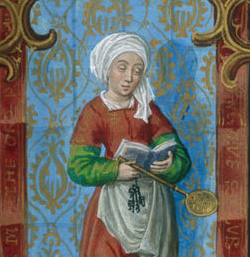Saint of the Day Online - St Martha
Saint of the day online, Saturday, March 29, 2017
29-07-2017
Saint Name: St Martha
Place: Isreal
Feast: July 24
St Martha who was born in Isreal is a biblical figure described in the Gospels of Luke and John. she is described as living in the village of Bethany near Jerusalem. She was witness to Jesus' resurrection.
"Jesus loved Martha and Mary and Lazarus." This unique statement in John's gospel tells us of the special relationship Jesus had with Martha, her sister, and her brother.
Apparently Jesus was a frequent guest at Martha's home in Bethany, a small village two miles from Jerusalem. We read of three visits in Luke 10:38-42, John 11:1-53, and John 12:1-9.
Many of us find it easy to identify with Martha in the story Luke tells. Martha welcomes Jesus and his disciples into her home and immediately goes to work to serve them.
Hospitality is paramount in the Middle East and Martha believed in its importance. Imagine her frustration when her sister Mary ignores the rule of hospitality and Martha's work in order to sit and listen to Jesus. Instead of speaking to her sister, she asks Jesus to intervene.
Jesus' response is not unkind, which gives us an idea of his affection for her. He observes that Martha is worried about many things that distract her from really being present to him. He reminds her that there is only one thing that is truly important -- listening to him. And that is what Mary has done.
In the Gospel of John, Martha and Mary appear in connection with two incidents: the raising from the dead of their brother Lazarus (John 11) and the anointing of Jesus in Bethany (John 12:3).
In the account of the raising of Lazarus, Jesus meets with the sisters in turn: Martha followed by Mary. Martha goes immediately to meet Jesus as he arrives, while Mary waits until she is called. As one commentator notes, "Martha, the more aggressive sister, went to meet Jesus, while quiet and contemplative Mary stayed home. This portrayal of the sisters agrees with that found in Luke 10:38–42." In speaking with Jesus, both sisters lament that he did not arrive in time to prevent their brother's death: "Lord, if you had been here, my brother would not have died" (John 11:21, 32). But where Jesus' response to Mary is more emotional, his response to Martha is one of teaching calling her to hope and faith:
When Martha heard that Jesus was coming, she went out to meet him, but Mary stayed at home. "Lord", Martha said to Jesus, "if you had been here, my brother would not have died. But I know that even now God will give you whatever you ask."
Jesus said to her, "Your brother will rise again."
Martha answered, "I know he will rise again in the resurrection at the last day."
Jesus said to her, "I am the resurrection and the life. He who believes in me will live, even though he dies; and whoever lives and believes in me will never die. Do you believe this?"
"Yes, Lord", she told him, "I believe that you are the Christ, the Son of God, who was to come into the world."
(John 11:20–27, New International Version)
As the narrative continues, Martha calls her sister Mary Magdalene to see Jesus. Jesus has Mary bring him to Lazarus' tomb where he commands the stone to be removed from its entrance. Martha here objects, "But, Lord, by this time there is a bad odor, for he has been there four days", to which Jesus replies, "Did I not tell you that if you believed, you would see the glory of God?" (John 11:39–40). They then take away the stone and Jesus prays and calls Lazarus forth alive from the tomb.
Martha appears again in John 12:1–8, where she serves at a meal held in Jesus' honor at which her brother is also a guest. The narrator only mentions that the meal takes place in Bethany, while the apparently parallel accounts in the Gospels of Matthew (Matthew 26:6–13) and Mark (Mark 14:3–9) specify that it takes place at the home of one Simon the Leper. As the Catholic Encyclopedia notes, "We are surely justified in arguing that, since Matthew and Mark place the scene in the house of Simon, St. John must be understood to say the same; it remains to be proved that Martha could not 'serve' in Simon's house." It is at this meal that a woman (Martha's sister Mary, according to John) anoints Jesus with expensive perfume.